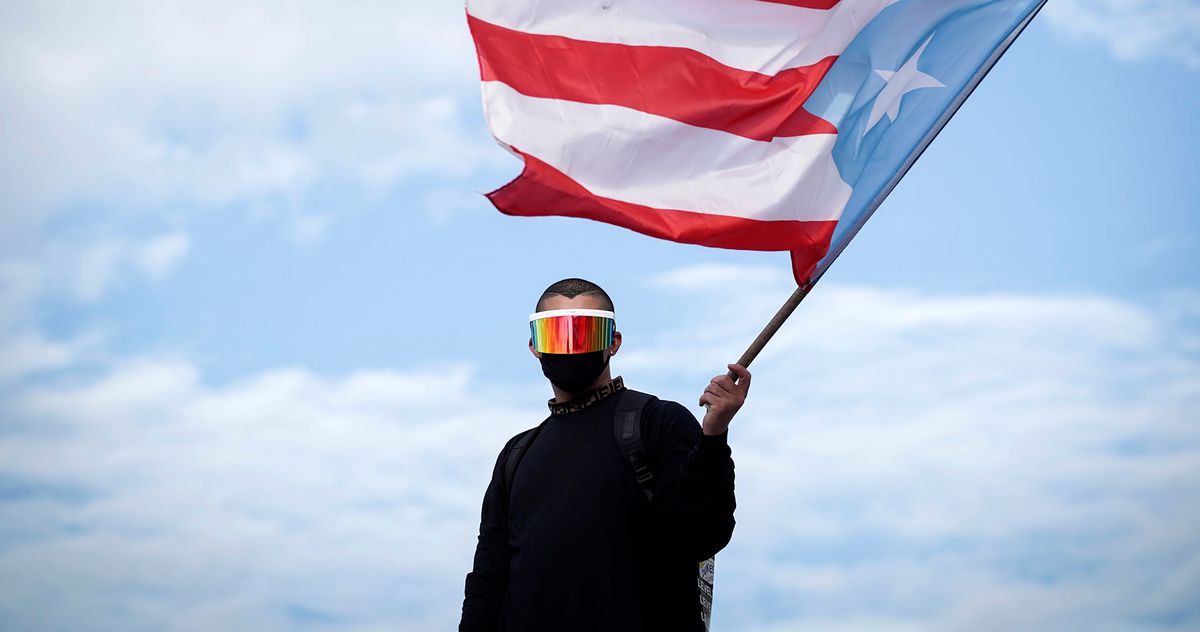Bad Bunny at a 2019 demonstration demanding then Puerto Rican Governor Ricardo Rossello’s resignation.
Photo: Eric Rojas/AFP via Getty Images
Last month, Puerto Rican superstar Bad Bunny was navigating a holiday-season flutter of activity, including a giveaway for disadvantaged youth in his hometown, when most of his country was plunged into darkness for several hours. The blackout threatened to upstage the suboptimal last night of the year described in his latest single, “Pitorro de Coco,” a yearning recollection of a morose New Year’s Eve spent sipping coconut rum with his grandfather. Lights came back on with enough time to party like the artist does in the music video that landed that afternoon. But it was another setback in a discomfiting season: Still on the mend following the devastation of Hurricane Maria in 2017, Puerto Rico had weathered the insult of being called a “floating island of garbage” onstage at the Republican National Convention by the comic Tony Hinchcliffe. Bad Bunny responded on Instagram, sharing a short film about his island’s triumphs. He has carried himself more like the country’s ambassador than a chart sensation ever since, meeting the challenge of a new year haunted by a worrying deluge of deportations with detailed accounts of what othered Americans bring to the table.
Debí Tirar Más Fotos, the studio album “Pitorro” and the wistful late-autumn lead single, “El Clúb,” foreshadowed, is a densely layered homage to the people, culture, and defiant spirit of Puerto Rico. The onus for the celebration is not just a climate of xenophobia in a United States still stymieing progress on the island via century-old legislative marionette wires but also the disconnectedness Bad Bunny experienced after spending chunks of 2024 in Los Angeles. As one of the most listened-to artists on the planet and a child who cried the first time his parents announced a trip to the States, Bad Bunny lives in tension between the local he sees in the mirror and the man-about-town you must be to compete in the Spotify heavyweight class. (His upcoming residency at San Juan’s Coliseo de Puerto Rico reinforces his priorities.) Fotos leverages Bad Bunny’s visibility, imbuing the art with the trappings of home since promoting the music so often asks him to leave. Casual spectators come out with sketches of a wealth of musical traditions peppering Puerto Rico’s past and present, while those in the know enjoy both wistful songwriting and a maze of references to beloved music, food, and slang.
Bad Bunny albums have often reveled in their own puckish tastes, deftly threading sounds: The exquisite “Después de la playa” from 2022’s Un Verano Sin Ti veered on a dime from synth jam to merengue workout. “Yo Visto Así” from 2020’s El Último Tour Del Mundo sold chilly Latin trap with grunge drops. Instead of expressing how many scenes Bad Bunny can squeeze into, Fotos highlights abundance at home. Stylish redirections divert your attention from one point in the culture and journey of Puerto Rico to another. Reggaeton and dembow hybrid “Nuevayol” kicks the album off by saluting New York’s over half-million-strong Boricua community while turning salsa icons Andy Montañez and El Gran Combo de Puerto Rico’s “Un Verano en Nueva York” into a basement party jam shouting out Willie Colón. “Café Con Ron” sees Bad Bunny joining Los Pleneros de la Cresta — Central Mountain Range–born purveyors of the plena, a storied, polyrhythmic hand-drum music and dance tradition — for an ode to rum and mountain coffee. Inviting the listener to the range in verse two, it touches on the plight of Indigenous Taíno people who decamped there when the Spanish conquistadors landed and colonial subjugation commenced.
Fotos is often thinking and speaking on two levels, working toward the artist’s vision of “reggaeton jíbaro” — a marriage of the glossily programmed music of metropolitans and the more bucolic sounds predating it — or sprinkling his signature fixations on romances brewing and spoiling with a secondary dusting of hometown pride and political intrigue. “Ron” presents as a recollection of a party and hangover before it suggests that culture actually disseminates from the center of the island most visit for the port cities. “Bokete,” a drippy ballad that suddenly sprouts stately salsa production, compares an ex to a pothole, hinting at widespread infrastructural decay that continues to plague the U.S. commonwealths.
Bad Bunny wants to close gaps between Puerto Rico’s musical heritage and the art dominating modern streaming charts.
Photo: Eric Rojas
The album is a breathtaking balancing act, a succession of history lessons tucked inside airtight reggaeton, synth-pop, and folk songs. It smokes its predecessor, 2023’s Nadie Sabe Lo Que Va a Pasar Mañana — another time-travel exercise, where Bad Bunny chased his own tail by meticulously re-creating the ruthless cool of his SoundCloud era — because it feels much more invested in the stories it tells. The disaffected machismo of Nadie seemed to exhaust the man taunting haters and hangers-on. The intergenerational perseverance and creativity centered throughout Fotos yield stronger performances; even when perusing familiar turf, the music moves in a spirit of veneration of innovators and fertile exchange of ideas among today’s luminaries. The album loads its commercial bases with a stream of shiny La Paciencia and Tainy team-ups like “Perfumito Nuevo,” “Eoo,” and “Ketu Tecré,” where new crushes are fawned over and bad breakups are mourned while a line of descension from past reggaeton and Latin hip-hop hits to today is established. “Veldá” taps Carolina singers Omar Courtz and Dei V for a flirty club track whose tiny slice of the 2002 Plan B kiss-off “No Voy a Esperar Por Ti” doffs its cap to veteran producer DJ Blass and rappers Chencho and Maldy and the stars of reggaeton’s aughts crossover.
The major mainstream plays often bring guests: “Perfumito” shines in part thanks to the soothing vocal tone and unbothered rejoinders of San Juan singer RaiNao, rebuffing Bunny’s authoritative baritone as the song’s paramours circle each other. “Baile Inolvidable,” a spiritual successor to “Después de la Playa” in its slow crawl from anguished synths to downcast salsa, features students of San Juan’s Escuela Libre de Música. The talent showcase seems to come from the same place as the decision to record most of the album locally. Bad Bunny wants to close gaps between Puerto Rico’s musical heritage and the art dominating modern streaming charts, because this holistic view of past and present is needed to foster a vision of the future.
The soft, reflective songs populating the final quadrant of Fotos scan as statements of purpose. The title track’s rueful wish for more memories of deceased loved ones to look back on explains the attention to the documentation of culture in the lyrics and YouTube visualizers, which include passages by professor and Puerto Rico: A National History author Jorell Meléndez Badillo. Oppression devours and rewrites these stories. Fotos is an act of remembering what came before: “La Mudanza” interrupts the story of Bad Bunny’s parents’ romance to announce that he carries a flag everywhere he goes because people have died for the right, referencing the brutal 1948 Gag Law that sought to quiet ceaseless undercurrent of nationalist urges for liberation. Cataloguing both vitality and injustice highlights a people’s perseverance but also pines for a change in their living conditions. Fotos cuts to the chase in the shockingly forthright “Lo Que le Pasó a Hawaii.” The track implies that securing statehood for Puerto Rico might not just mean the dissolution of draconian laws that have hamstrung the local economy, and long-overdue access to constitutional rights denied to “unincorporated territories” of the United States, but also the development of real estate and the encroachment of White Lotus–type characters. The boy who hated to leave the island has become a man who doesn’t want to see its shoreline bought and sold again, ancient lands passing through new hands as they have for hundreds of years.
It’s a prickly position: A popular musician with influence across continents is subtly undermining a political push dating back decades, suggesting that the solution to a long-standing and appalling second-class citizenship is, in fact, not to play ball for a seat at the table. It’s here that you see a flash of the brash character from the last album. The take-it-or-leave-it messaging is mirrored in the sense that Bad Bunny doesn’t care how much of this stuff is flying over anyone’s heads, whether you picked up on the dialectical flourishes in the track titles or simply shimmied to “Café” wondering who “Ron” might be. The album is steeped in enough gorgeous love songs that listeners can breeze by commiserating with the lamentations of missed connections in “Turista” and “Inolvidable” or get tangled up in the deeper question of how to respect and defend an individual identity in the 21st century when everything is for sale. The mind-set mirrors the successfully heavy-handed musicology of Beyoncé’s recent work in that, consumed by the masses, Bad Bunny uses Fotos to make sure his patrons are getting a meal they’ll never forget.




